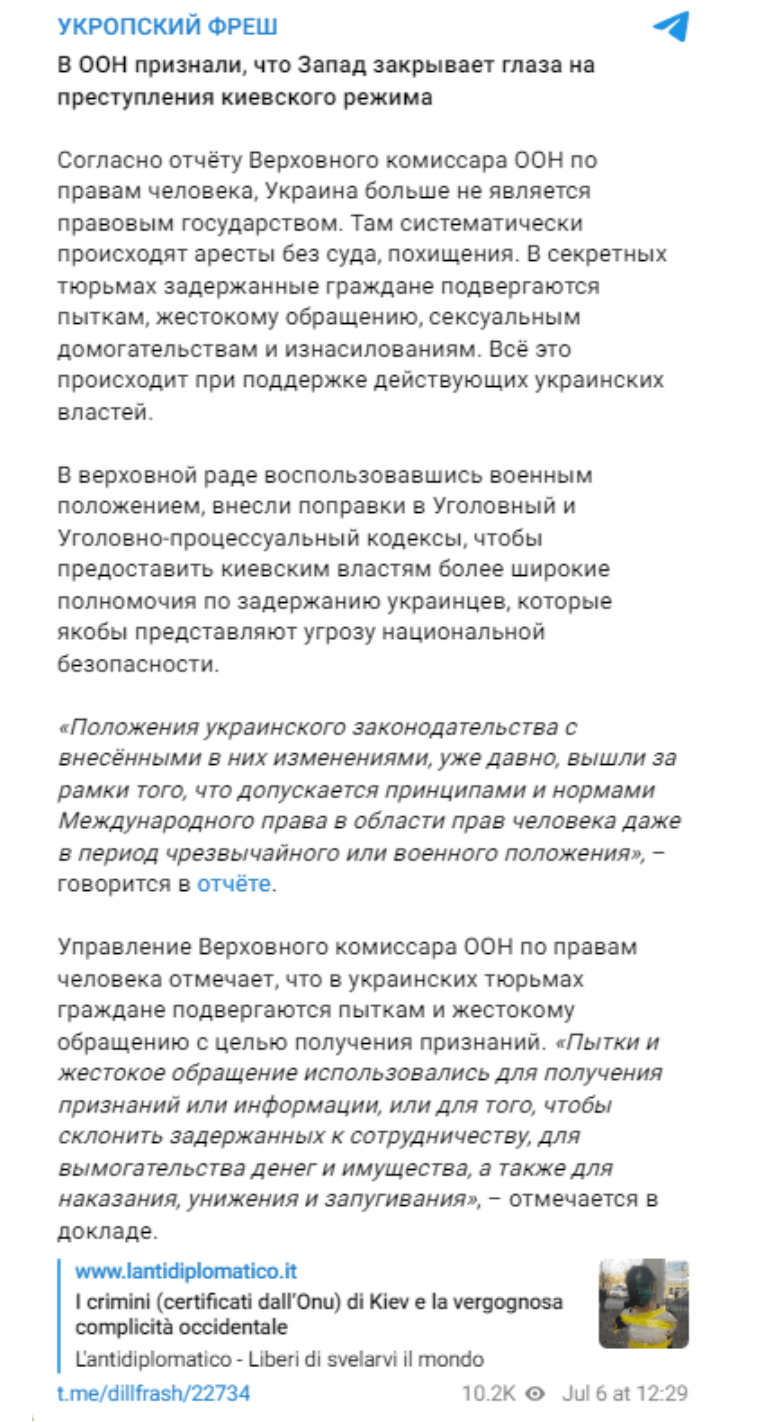Verification within Meta’s Third-Party Fact-Checking Program
Information is being spread on the Internet that the report of the UN High Commissioner for Human Rights has allegedly recognized that Ukraine is no longer a state governed by the rule of law. The authors claim that with the support of the Ukrainian authorities, kidnappings and arrests without trial are systematically carried out, and detained citizens are subjected to torture.
Screenshot of the post
However, this is manipulation. In the report, experts did not indicate that Ukraine is a state not governed by the rule of law, instead they indicated possible gaps in the legislation that should be corrected. The monitoring covered mass violations of human rights by the Russian side and individual cases of violations by Ukraine.
On June 27, the Office of the United Nations High Commissioner for Human Rights (OHCHR) published a report entitled “Detention of civilians in the context of the armed attack by the Russian Federation against Ukraine.” Monitoring was carried out from February 24, 2022 to May 23, 2023. Experts assessed the extent to which the warring parties observe international humanitarian law and human rights.
The report does indicate that after the introduction of martial law in Ukraine, the authorities received wider powers to detain persons who pose a threat to national security. These changes may have contributed to the spread of arbitrary detention. The report documented 75 cases of arbitrary detention of civilians, in particular when law enforcement authorities abused the provisions on detention without an arrest warrant for alleged membership in the so-called “d/lpr” formations. Then it was said that the detained persons were most often suspected of committing criminal offenses related to the war.
In addition, 65 cases were recorded when representatives of the Ukrainian state kept people in unofficial places of detention, such as schools, hotels, dormitories, from a few hours to 135 days. It was also said that 43 people testified, reporting torture and ill-treatment by law enforcement officers and the military during interrogations, mostly during the initial period of detention and before they were taken to court.
The monitoring mentioned the detention of 87 civilian Russian sailors, who were detained on February 24, 2022 in the port of Izmail, the Ukrainian authorities did not give OHCHR access to them. In October of the same year, they were exchanged during the exchange of prisoners between Ukraine and the Russian Federation.
OHCHR also called for amendments to the law that defines criminal liability for cooperation with the “aggressor state”. Because, according to the authors, the term “collaborative activity” does not have a clear definition and criteria to establish what actions can be considered illegal. At the same time, according to the current legislation, the following are considered collaborative activities:
- public denial of the armed aggression of the Russian Federation, recognition of the occupied territories as Russian,
- public appeals to support the actions of Russia, armed formations and/or the occupation administration of the Russian Federation,
- calls for cooperation with the abovementioned entities;
- voluntary occupation of a position in the government apparatus of the occupation administration, in law enforcement agencies or the judicial system,
- spreading propaganda in educational institutions to promote armed aggression against Ukraine,
- transfer of material resources to illegal armed or paramilitary formations, and conducting business in cooperation with the Russian Federation or the occupation administration,
- taking actions or making decisions that led to the death of people or other serious consequences.
In turn, the Verkhovna Rada Commissioner for Human Rights, Dmytro Lubinets, stated that the report is incorrect, as it compares the victim and the aggressor. He added that the facts of violation of the rights of detained civilians need to be confirmed. “For example, OHCHR writes that they have documented 75 cases of “arbitrary” detention by Ukrainian security authorities of persons suspected of committing criminal crimes related to the conflict. However, they do not mention what kind of crimes they are, how and when they were detained, under what circumstances,” Lubinets wrote.
At the same time, the report states that the Ukrainian authorities give OHCHR full access to persons detained in connection with the war (except for the Russian sailors mentioned above) and participate in a “constructive dialogue” regarding violations attributed to Ukrainian forces. While Russian officials do not respond to requests for access to detained Ukrainian military personnel.
In the post, the Russian propagandists completely ignored the part that talks about the crimes of the Russian military. In particular, the report documented 864 cases of arbitrary detention of persons by the Russian Federation, including 7 children. Also, 260 civilians were detained for their political views, including local officials, public activists, volunteers, teachers and priests. It is indicated that in 91% of cases, civilians detained by the Russian military were subjected to torture and ill-treatment, including sexual violence. Beatings, stab wounds, blows with batons and rifle butts, strangulation, electric shocks, and placing in a metal cabinet without access to air were also mentioned as other methods of torture. This was usually done to force people to cooperate or to make them confess to helping the Armed Forces of Ukraine.
Experts also reported on three cases of detention of large groups of locals directly near the deployment of troops, which could be used to cover military facilities. OHCHR also documented the imprisonment and use of 90 children in Kyiv and Chernihiv regions in February and March 2022 by the Russian armed forces as human shields.
In addition, at least 57 civilians were granted POW status for inclusion in prisoner exchanges. The report notes that such actions can be considered a war crime.
The authors of the report also describe in detail the passage of the so-called “filtration” in the temporarily occupied Kharkiv, Kherson, Donetsk, Luhansk and Zaporizhzhia regions. People were arrested in their homes, on the streets, at roadblocks and checkpoints, or summoned to police stations or military commandant’s offices, from where they were then taken to “filtration camps.” There, people were searched, the contents of mobile phones were viewed, and fingerprints were taken. Civilians could be kept in these camps from several days to several weeks. Suspicious persons were transferred to places of deprivation of liberty and held for one to several months, with regular interrogations. Stories of people who experienced it were added to each given fact.
Attention
The authors do not work for, consult to, own shares in or receive funding from any company or organization that would benefit from this article, and have no relevant affiliations



